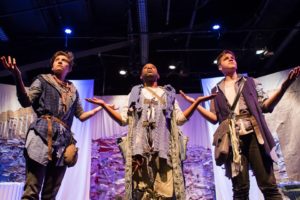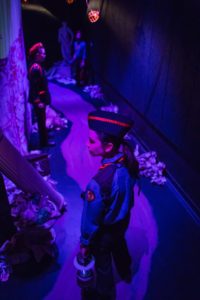
by James Wilkinson
‘Antigone’ – Written by Jean Anouilh, and adapted by Lewis Galantiere. Presented by Flat Earth Theatre. Directed by Lindsay Eagle. Set Design: Darren Cornell. Assistant Set Design: Marina Sartori and Emily Penta. Costume Design: E. Rosser. Props Design: Emily Penta. Lighting Design: PJ Strachman. Sound Design: Chris Larson. Graphic Designer: Jake Scaltreto. Violence Designer: Matt Arnold. Dramaturg: Betsy S. Goldman. Artistic Sign Language Consultant: Kristin Johnson. Presented by Flat Earth Theatre at The Mosesian Center for the Arts, 321 Arsenal St. through March 31
You don’t need to wait for the Greek chorus to tell you that things will not be turning out okay. A palpable aura of dread surrounds Flat Earth Theatre’s production of Antigone from the moment you enter the space. The audience takes their seats by passing through the a wreckage of a recent war, stared down by a trio of imposing soldiers, guided through the shadows by a dim set of industrial lights. A droning sound off in the distance envelops the space, keeping you from truly relaxing into your seat. It’s a wonderfully intoxicating environment to be stepping into. Most people tend to associate classical works with dusty libraries and dry academia. It’s nice to be reminded that in the right directorial hands, there’s a vital, thrilling world to be conjured with those texts.
Antigone is the second production in what Flat Earth is calling their “Season of Dissent” and it marks another attempt to try to sort out the present by digging into the past. The first play in the season, Tony Kushner’s A Bright Room Called Day, charted the rise of Nazism in Germany during the first half of the twentieth century. There’s a direct line to be drawn from that play to this one, as the Antigone we are viewing is not the original Greek text, but an adaptation of Sophocles’ work by the French playwright, Jean Anouilh. Anouilh wrote the play in the 1940’s under German occupation as a reaction to Nazi rule, and when paired with Kushner’s text as Flat Earth has done, it creates a fascinating conversation about the nature of resistance.
But I am getting ahead of myself…

The events of Anouilh’s play follows Sophocles’ original blueprint fairly closely. King Creon has recently squashed an uprising lead by his nephew, Polyneices. After victory, Creon makes a decree that no one shall provide a burial for the rebels. This would have been a controversial decision as the Greeks believed that denying the body a proper burial prevented the soul from rest. Enter Antigone, daughter of Oedipus, sister of Polyneices, and fiancé to Creon’s son Haemon, who defies the orders and attempts to bury her brother. All of this happens prior to the start of the show. What Anouilh is interested in (taking his cue from Sophocles) is tracing the fallout from Antigone’s act of defiance as it heads towards tragedy. Based on the description in the previous lines, you may be tempted to assume that Creon is the leading character in this piece, but I assure you that the play belongs to its namesake. Part of what Anouilh is interested in is how individuals stand up to power and we watch that happen as Antigone sacrifices herself for what she believes is a cause higher than Creon’s rule of law.
Under company member Lindsay Eagle’s direction, Flat Earth Theatre has created an interesting little pressure cooker to set their Greek tragedy. Everything about the design feels heightened. Lighting designer PJ Strachman coats the stage in electric colors. Sound Designer Chris Larson’s ambient noise ratchets up the tension through the course of the evening. Oddly enough, I think that it’s because of this heightening that the moments from the show that most hit me were moments of silence when it seemed that all of the air had been sucked out of the room. Performing his lines in American Sign Language, Elbert Joseph delivers a ferocious performance as leader of the Chorus. He only utters one line through the course of the evening, but the command of his storytelling has a kind of gravitational pull. He’s aided by Michael John Ciszewski and Emily Elmore and together, the three give the tragedy its backbone. As they describe and deconstruct the events on stage, you get the sense that there are larger forces at work behind the characters, that the tragedy truly is inevitable. I could have watched the three all night. Likewise, as Creon’s wife Eurydice, Lisa Burdick spends almost the entire play silent and off to the side. It’s only at the end of the play that she takes center stage and has a moment that shook me in a way that I wasn’t prepared for.

Given that the play is about a woman standing up to the large patriarchal forces at work in society, you’d have to be blind to not see the play’s connections to the present political moment. I suppose on some level, it’s comforting to know that this is an issue humanity has been struggling with for some time (On another level, it’s depressing to think that after all that time, we still haven’t figured our sh*t out). At her core, Antigone is simply a woman doing what she thinks is right. It’s the kind of act that sounds small but sets off large consequences. As Antigone, Regine Vital delivers a touching performance that allows us to see the woman who is trying her hardest to follow her own moral compass.
As I said, the production provides a very interesting contrast to Flat Earth’s earlier production of A Bright Room Called Day which I think is worth noting. Kushner’s play seemed, in part, to dramatize the dangers of not speaking out against power. Characters in that play kept refusing to acknowledge the Nazi party as any sort of serious threat, even as it continued to make gains in the German government. It was hard not to feel helpless as a present-day audience member with the gift of hindsight. Here, Anouilh seems to be reminding us of the tremendous cost that can come from defying tyrants and doing the right thing. He’s not arguing that we shouldn’t do it. Quite the opposite, I think he’s arguing that despite the dangers it needs to happen. That there can be a larger moral issue that stands outside the politics of law. With one more show in their season of dissent, I’m interested to see where Flat Earth takes this conversation. There may not be any easy answers, but it’s a conversation worth having.
For tickets and more information, visit their website at: www.flatearththeatre.com

